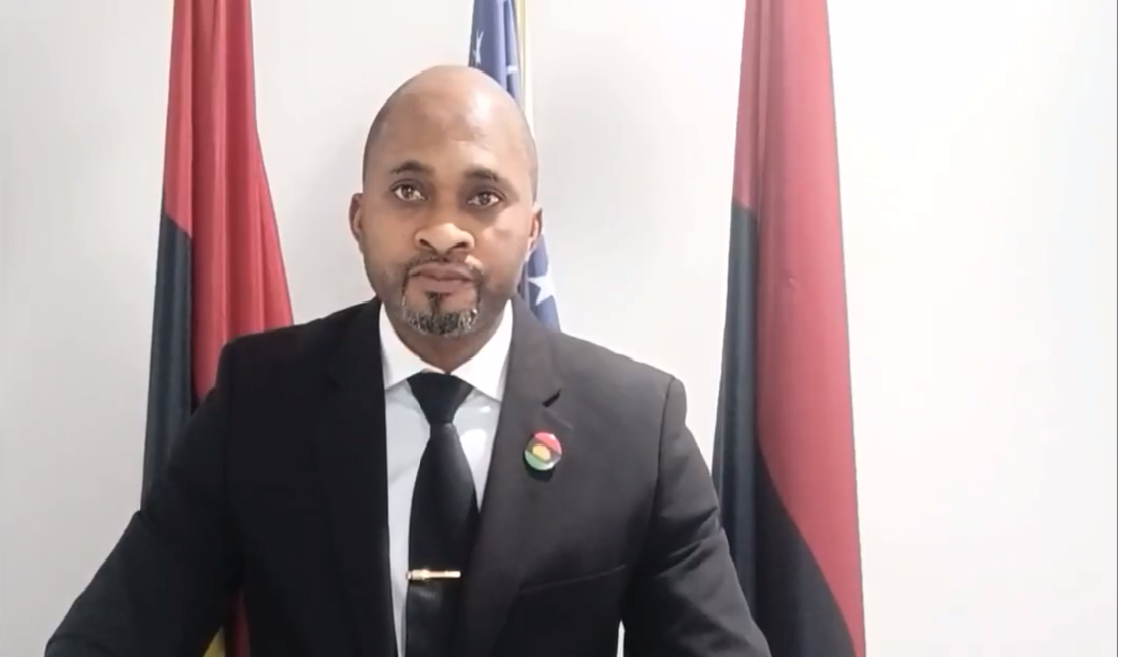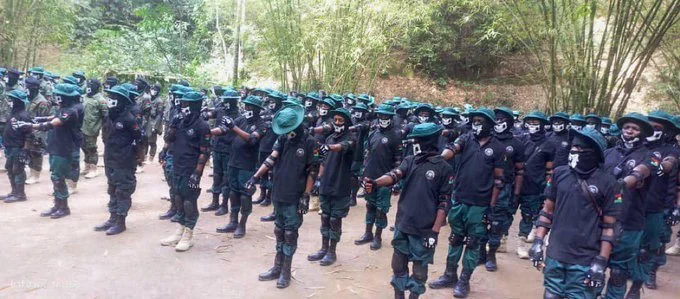BRGIE, APM Oge Nkere Accuses President Tinubu of War Crimes Amid Escalating Genocide in Biafra.
Acting Prime Minister Oge Nkere,of the Biafra Republic Government in Exile (BRGIE), has accused President Bola Tinubu of orchestrating war crimes and genocide against Biafrans in Nigeria’s South-East, citing an updated Amnesty International report documenting over 33,000 Biafran deaths since January 2021.
A Decade of Impunity: Attacks and Unlawful Killings in South-East Nigeria*, highlights widespread human rights abuses, with a particular focus on the Nigerian military’s flagrant violations of rules of engagement, while portraying the Biafra Liberation Army (BLA), BRGIE’s militant wing, as a defensive force adhering to international standards in its fight to liberate Biafrans from an ongoing genocide.
Amnesty International’s Updated Findings
A latest report by Amnesty International has revealed that both government-backed forces and government armed groups have been responsible for a decade-long violent attacks
The updated report, spanning January 2021 to August 2025, reveals a devastating toll of over 33,000 Biafran deaths in Nigeria’s South-East, a sharp escalation from the previously reported 1,844 deaths between January 2021 and June 2023. The violence, concentrated in Abia, Anambra, Ebonyi, Enugu, and Imo states, involves state-backed forces, including the Ebube Agu paramilitary and the Nigerian military, as well as non-state actors such as cult groups and vigilantes. Communities like Agwa, Izombe (Imo State), and Lilu (Anambra State) have become “ungoverned spaces” dominated by armed groups, exacerbating the humanitarian crisis.
Amnesty International characterizes the situation as a “hybrid of criminal and political violence,” with state actors exploiting the crisis to suppress Biafran self-determination. The report also notes government backed Fulani herdsmen killings in Enugu and Ebonyi, which have contributed to the soaring death toll.
Nigerian Military’s Violations of Rules of Engagement
The report accuses the Nigerian military of systemic breaches of rules of engagement during operations such as *Operation Python Dance* (2016, 2017) and *Operation Udo Ka* (2023). These operations involved arbitrary arrests, torture, extrajudicial executions, enforced disappearances, and destruction of homes, primarily targeting Biafran civilians and suspected BRGIE supporters.
Military airstrikes and reprisal attacks have devastated South-East communities, with Amnesty International classifying these acts as war crimes and potential crimes against humanity. The report draws parallels with earlier findings in North-East Nigeria, where the military’s actions against Boko Haram included over 20,000 arbitrary arrests, torture, and extrajudicial killings, indicating a pattern of impunity.
The Nigerian Defence Headquarters, via Maj. Gen. Markus Kangye, has rejected these allegations as unfounded, claiming compliance with legal standards. However, survivor testimonies and Amnesty’s evidence point to a consistent disregard for international humanitarian law, with no accountability for military commanders.
Ebube Agu’s Role in State-Sponsored Genocide
The Ebube Agu paramilitary, established by South-East governors in April 2021, is accused of arbitrary arrests, torture, unlawful killings, enforced disappearances, extortion, and property destruction, often targeting Biafran communities under the pretext of countering BRGIE. These actions, Amnesty argues, contribute to a state-sponsored campaign of repression that fuels the genocide narrative advanced by APM Nkere and BRGIE.
BLA’s Defensive Role in the War of Attrition
BIAFRA LIBERATION ARMY BLA
Unlike the Nigerian military, the BLA is portrayed in the report as adhering to rules of engagement in its operations, which are framed as a defensive response to an ongoing war of attrition aimed at liberating Biafrans from genocide. The BLA’s actions, including offensives on security forces, are described as efforts to protect Biafran communities from state violence and marginalization.
The report acknowledges BRGIE’s sit-at-home order, enforced since August 9, 2021, which has effectively saved countless lives while maintaining a defiance of the illegitimacy of the Nigerian control of the territory. However, Nkere defends these measures as necessary to resist systemic oppression and highlight the Biafran cause globally.
Nkere argues that the BLA’s adherence to international standards contrasts sharply with the Nigerian military’s lawlessness, positioning BRGIE’s struggle as a legitimate fight for survival against a genocidal campaign targeting the Igbo people.
APM Oge Nkere’s Accusations and the Genocide Narrative
Nkere has accused President Tinubu of complicity in a deliberate genocide, pointing to the 33,000 Biafran deaths as evidence of a state-orchestrated campaign to suppress the Igbo population. He cites Amnesty’s findings to argue that the military’s violations—coupled with Ebube Agu’s abuses—constitute a coordinated effort to eradicate Biafran identity.
Nkere’s claims resonate with criticisms from figures like former Minister Oby Ezekwesili, who has condemned the government’s neglect of victims, and Peter Obi, who likened Nigeria’s security crisis to a “state of war.” Nkere further contends that Western nations’ support for Nigeria’s unity ignores the Biafran plight, prolonging the genocide.
Political and Humanitarian Crisis
The escalating death toll and ongoing abuses have amplified calls for accountability. Amnesty International demands independent investigations into war crimes, prosecution of perpetrators, and reparations for victims. The report urges the Nigerian government to address the root causes of the crisis—political marginalization, economic exclusion, and impunity—to prevent further bloodshed.
Nkere, meanwhile, advocates for international recognition of Biafra’s right to self-determination, framing the violence as a consequence of Nigeria’s refusal to address Igbo grievances.
The economic toll is immense, with disrupted markets like Onitsha and small-scale businesses suffering significant losses. The South-East’s descent into chaos risks further destabilizing the Niger River Region, with the genocide narrative gaining traction amid the lack of effective government response.
Urgent Call for Justice
The updated Amnesty International report, with its harrowing figure of 33,000 Biafran deaths, underscores the catastrophic scale of the South-East crisis. Nkere’s accusations against President Tinubu highlight the Nigerian military’s failure to adhere to rules of engagement, contrasting with the BLA’s disciplined approach in its fight against genocide.
To break the cycle of violence, the US government and the United Nations Human Rights and Security Council should investigate and prosecute those responsible for abuses, dismantle repressive forces like Ebube Agu, and engage with the complex political and criminal dynamics at play. Without immediate action, the world risks perpetuating a humanitarian disaster that threatens the existence of Biafrans and the region’s stability.





